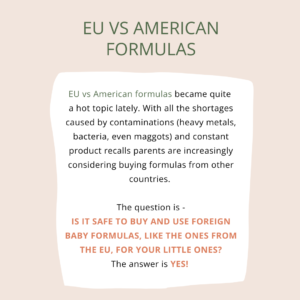

The short answer is yes. And – in my opinion – EU formulas are far better quality than US ones.
To give you a bit of a perspective – out of all US-made formulas, only one named “Bobby” meets the EU food standards. In fact, Bobby is marketed as a “European style “formula. This formula tastes and smells much more similar to EU formulas like HIPP and HOLLE. And yes – I tased various formulas out of curiosity and because I wanted to know what I was feeding the babies in my care. You should try it too!
A few years back, I had a baby under my care that flat-out refused to drink all US formulas we’ve tried. I asked the mom to try EU formula – and the baby finally took the bottle. Mom also did the taste test – the difference in smell and taste between US and EU-made formulas is staggering. US formulas stink to high heaven.
Why do I prefer and trust the EU formulas? For one, EU food norms are stricter, especially regarding organic baby food production. And two – non-organic food production is way cleaner in the EU. Compared with the EU, the US authorizes almost 50% more highly hazardous (extremely harmful to human health) pesticides like permethrin – a known carcinogen, or chlopyrophos – an insecticide linked to brain development issues in kids. Also, the allowed amounts of pesticide residues on fruit and vegetable are much higher in the US. For example – US-produced apples have almost 400 times more malathion residue – a known carcinogen. US-produced grapes are allowed to contain 1000x more insecticide propagite, a known human carcinogen, and developmental and reproductive toxin.
Things to have in mind when considering buying foreign/EU formulas:
Good:
- very high quality and organic
- variety – cow milk-based, goat milk-based, or non-milk based if your baby is allergic or sensitive;
Bad ( but not really):
- They are not FDA-approved – but it turns out neither are US brands; excerpt from FDA website: “The FDA regulatory requirements address the safety, nutritional adequacy, packaging, and labeling of these products. The FDA does not approve infant formulas; however, infant formula manufacturers must notify the agency before marketing a new formula.”
- Use instructions on packaging are primarily in the metric system and may be in different languages with translation on top of it;
Here are websites trusted by parents to buy formulas ( links in bio):

